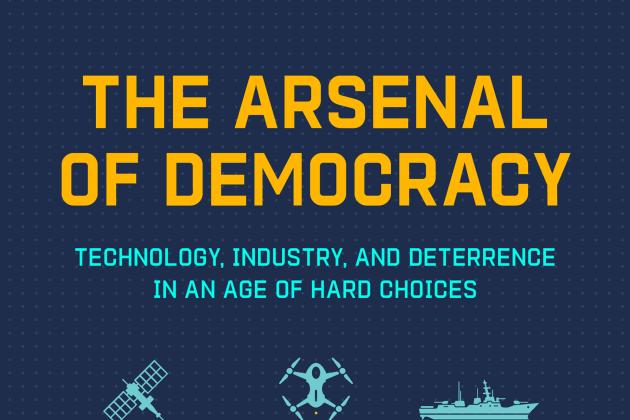The Hoover Applied History Working Group hosted a special book-launch seminar: Analog Superpowers: How Twentieth-Century Technology Theft Built the National Security State on March 14, 2024.
ABOUT THE TALK
Join us for a book talk that will span law, international affairs, and top-secret technology to unmask the tension between intellectual property rights and national security.
At the beginning of the twentieth century, two British inventors, Arthur Pollen and Harold Isherwood, solved a major military problem: how to aim and fire the big guns of battleships in poor conditions. Pollen and Isherwood built an integrated system for gathering data, calculating predictions, and transmitting the results to the gunners. At the heart of their invention was the most advanced analog computer of the day, a technological breakthrough that anticipated the famous Norden bombsight of World War II, the inertial guidance systems of nuclear missiles, and the networked “smart” systems that dominate combat today. Recognizing the value of Pollen and Isherwood’s invention, the British Royal Navy and the United States Navy pirated it, one after the other. When the inventors sued, both the British and US governments invoked secrecy, citing national security concerns.
Drawing on a wealth of archival evidence, Kate Epstein analyzes these and related legal battles over naval technology, exploring how national defense tested the two countries’ commitment to individual rights and the free market. Epstein’s account reveals that long before the US national security state sought to restrict information about atomic energy, it was already embroiled in another contest between innovation and secrecy. The America portrayed in this sweeping and accessible history isn’t yet a global hegemon but a rising superpower ready to acquire foreign technology by fair means or foul—much as it accuses China of doing today.
>> Niall Ferguson: Hello, my name is Niall Ferguson. I'm the Milbank Family Senior Fellow here at the Hoover Institution. And we have just had the great privilege of hearing from Kate Epstein, a professor at Rutgers who's an old friend of the Applied History Working Group. She's talking about her new book, Analog Superpowers, How Twentieth-Century Technology Theft Built the National Security State.
Kate, welcome. It's great to have you here. Tell us a bit about technology theft. It's in the news a lot these days, cuzwe usually hear that China's been stealing American technology. But your story's from a period when it was Americans who did the stealing.
>> Kate Epstein: Indeed it is.
Thank you very much for having me. So my book, as you allude to, follows the American theft after the British theft of a pioneering system for aiming the big guns of battleships in the early 20th century. And just as you say, this is a period when the United States was not the hegemon of the day, Britain was.
And the United States was chasing Britain in much the way that China has been chasing the United States. And much as China has sought to acquire, by fair means or foul, foreign technology and intellectual property, so the United States did in the kind of the 19th century into the 20th century.
>> Niall Ferguson: Tell us a bit about the core story in the book, because it's an absolutely fascinating story of technological innovators who basically get ripped off by not one, but two national security states. When does it happen? And who are the cast of characters?
>> Kate Epstein: Sure. So, yes, they had the misfortune, indeed, of being ripped off by two different countries.
So the protagonists of the book, so to speak, are Arthur Pollan and Harold Isherwood, these two quite brilliant English civilians who got very interested in the question of how to aim the big guns of battleships. So that they would actually be able to hit the target, which was, for various reasons, actually an increasingly difficult thing to be able to do at the turn of the century, as ship speeds increased and ranges got longer.
So Pollen and Isterwood, over about a dozen years before World War I, first came up with the idea for, and then built what was essentially an early computer for computing, I'm sorry, the equations that would be needed to actually make a hit. First, the Royal Navy, Britain's navy, pirated their system.
They had a naval officer named Frederick Dreyer, who developed a rival system exploiting his access to information about Pollen's and Isherwoods by virtue of his insider system. Sort of like one of the cheap knockoff purses you can get on the streets in Georgetown, where I grew up.
>> Niall Ferguson: And it is a knockoff cuz it's not as good.
>> Kate Epstein: It's a knockoff because it's not as good. It sort of, on the surface, could do some of the same thing, but when you really kind of probe, it did not have the same functionality. It wasn't designed actually to have the same functionality. Because Dreyer was content with solving a less difficult problem than Pollen and Isherwood were.
So the admiralty first basically adopted this plagiarized system that Dreyer had come up with. And then the American Navy did a similar thing. They had a defense contractor named Hannibal Ford, build a pirated version of Pollen's and Isherwood's system. But Ford did a much better job of pirating them than Dreier had done.
And the American purse, so to speak, was much closer to the real thing than Dreier's had been.
>> Niall Ferguson: I mean, if I were a defense tech entrepreneur and I read this book, I'd feel pretty sick, because Arthur Pollen and Harold Isherwood had come up with an amazing breakthrough.
I mean, they really create an analog computer unlike anything that had been done before. But instead of adopting their technology and paying them the royalties that they surely deserved, two governments rip them off and they don't even come up with something better. Each comes up with something that's slightly inferior.
I mean, it's kinda strange. Why do you think it happened that way? Why didn't they get their just reward, do you think?
>> Kate Epstein: Money and greed and ambition, I think, are probably the two big reasons. Certainly in the British case, I think ego had a lot to do with it.
I think it really hurt them that they didn't wear the uniform. And they were perceived as being sort of grubby defense contractors, not noble public servants, sort of a bit mercenary, whereas naval officers wore the uniform. They were devoted to the public good, and some of them were.
But Pollen and Isherwood were actually devoted patriots and nothing grubby about them. Actually, Pollan in particular came from quite a genteel.
>> Niall Ferguson: The best thing about Pollen is that he was a historian infact.
>> Kate Epstein: He was a historian,
>> Niall Ferguson: So my utter delight.
>> Kate Epstein: He was a historian-
>> Niall Ferguson: An Oxford historian, he had a degree in modern history from Trinity College, Oxford.
>> Kate Epstein: Indeed.
>> Niall Ferguson: And somehow or other, this historian turns out to be brilliantly good at computer technology as a true pioneer.
>> Kate Epstein: Indeed he did. Yes. I do not know how he did it.
I myself needed small words and sock puppets to understand the math and the technology at issue in this book. But, yep, he was just a sort of savant, I think. And was able to make the transition from kind of a humanities background to this incredibly cutting edge, sophisticated system for aiming the big guns with, as you say, this analog computer at its heart.
>> Niall Ferguson: Was it a war winning weapon? He came to believe, didn't he? That if they'd only adopted his analog computer, the Royal Navy would have performed much better in World War I, and particularly at the Battle of Jutland. Are you persuaded by that argument?
>> Kate Epstein: No, I think mainly just because I don't really think it's answerable.
There's so many variables in play what interests me more, and it is counterfactual. Ultimately his system was not tried in the war, so it's hard to say how exactly it would have done. His system was also never tested in head to head trials against Dreiser's system. I think because the Admiralty feared that if there were fair head to head trials, Dreier system would lose and they wanted the naval officer system, which also appeared to be much cheaper on the surface.
So I think I certainly don't make the argument in the book, I don't endorse Pollan's argument in the book that his system would have enabled victory at Jutland. What I think is a much sort of sounder way to tackle that question is, well, what did people who lived through it think of that counterfactual.
And I found a lot of evidence from both the British and the American archives suggesting that British gunnery experts believed that Dreier's system was a dead end based on the World War I experience. They ended up essentially plagiarizing Pollen a second time in the 1920s, but doing a much more thorough and competent job than Dreyer had done.
And that the system that they developed in the 1920s really embodied what they took to be the gunnery lessons of the war. And so I don't make the claim that the war vindicated what Pollan said before the war. I make the claim that gunnery experts at the time concluded that the war had vindicated major aspects of Pollen's arguments about what to expect.
>> Niall Ferguson: One last question. What does this tell us for our own time? We live in a time of even more rapid technological competition in multiple domains, some of them civilian and some of them military, and many of them both. My sense in reading the book is that if you are a real innovator but an outsider, you should approach with extreme caution, governments as customers.
Unfortunately, they're your only customers if you've decided to get into defense technology. Has anything improved? Are the pollens and Isherwoods of today just as likely to be treated this way, or have there been changes in the way that that kind of intellectual property is protected?
>> Kate Epstein: Certainly there have been changes in intellectual property law over the course of the 20th century into the 21st.
But if I were advising someone who was highly innovative, I would say make sure you have very good lawyers, because I think that governments still, and one can. I don't mean to sort of demonize the public sector in the book. The governments have reasons to worry about corporate profiteering.
There's an example in the book of an American firm that quite clearly took advantage of the fact that it had a monopoly position supplying a key technology. So there's grounds for kind of suspicion, I think, on both sides of that relationship. But certainly there's a lot of tension kind of in the burgeoning relationship, I think, between Silicon Valley and the Department of Defense over very similar issues to the ones that I discuss in my book.
They come up in the context of the US government's demand for data rights from its contractors. So the right essentially to be able to do what it wants with the data embodied in innovative products, ranging from technical drawings to corporate intellectual property. And obviously the last thing a firm wants is for its intellectual property to be shared with its competitors.
So that's still something that contractors have to worry about, and they also have to worry about government secrecy.
>> Niall Ferguson: So this is a book that I will not only be recommending to close friends, but I'll also be sending it to Paul Bala Lucky at Andrews, and Alex Carp at Palantir.
The book is Analog Superpowers, How Twentieth-Century Technology Theft Built the National Security State. And it's an absolutely perfect example of what I call applied history. Katie Epstein, thanks so much for coming to the Hoover Institution, and we hope to welcome you back when your next book is published.
Thanks.
>> Kate Epstein: Thank you for having me.
ABOUT THE SPEAKER

Kate Epstein is an Associate Professor of History at Rutgers-Camden, where she teaches courses in US history, military and diplomatic history, and historical methods. Her research focuses on the intersection of defense contracting, intellectual property, and government secrecy in Great Britain and the United States, as well as the “hegemonic transition” from the Pax Britannica to the Pax Americana. In addition to numerous scholarly articles, she has written two books: Analog Superpowers: How Twentieth-Century Technology Theft Built the National-Security State (University of Chicago Press, 2024) and Torpedo: Inventing the Military-Industrial Complex in the United States and Great Britain (Harvard University Press, 2014). In addition to her historical work she also writes essays and op-eds about politics and academia, which have appeared in the Wall Street Journal, Liberties, and American Purpose.



















